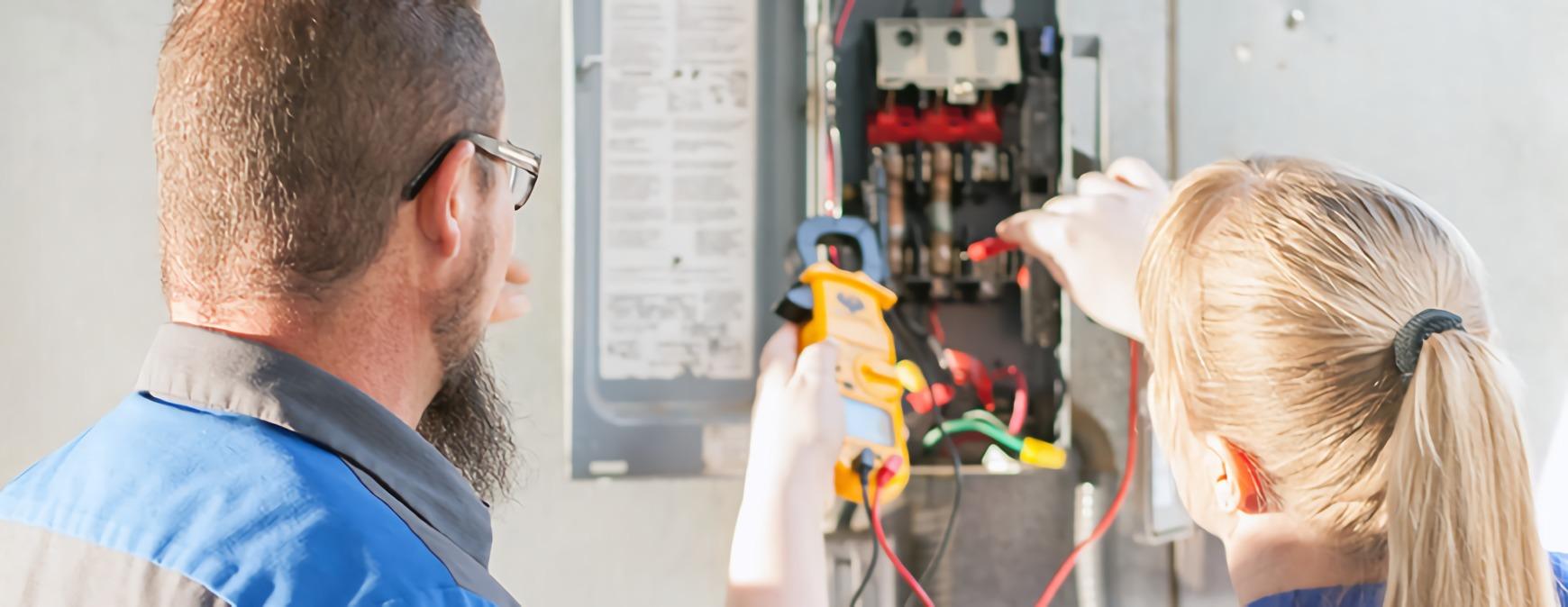
Electricians already play a pretty important role in the world. They keep the lights on in cities and towns across the globe. Their wiring work powers the factories where essential goods like cars and computers are made. And, of course, homes and businesses wouldn’t be able to operate without electricity: appliances, computers and the Internet would all flicker out.[1]
These days, electricians have yet another reason to feel good about their work. The growing trend of replacing the fossil fuels that generate electricity with cleaner alternatives like wind and solar power means that modern electricians can also help the environment.[2][3]
In fact, the Occupational Information Network (O*NET), describes the electrician trade as a “Green Increased Demand occupation.” This means technologies and activities involving the green economy will likely increase the employment demand for electricians without significantly changing the nature of the work. Specifically, electricians could find work in green construction in the coming years.[4]
What Is Green Construction?
Green construction is the practice of building homes, offices and other structures that have a minimal impact on the environment. Sustainability is a goal at each step of the construction process, from design to material selection to building practices.
This means using recycled or renewable materials and designing the structure to conserve as much water and energy as possible.
Get Started on the Path to a New Career
Fill out our form to learn how we can help you change your life.
Green Construction Goals
- Energy efficiency
- Water conservation
- Indoor air quality
- Clean onsite practices[5]
What Role Do Electricians Play in Green Construction?
Skilled trades workers are typically the last to enter a green construction site. After the architects have designed and the construction crews erected the building, these pros put their unique skills to work to further lesson its environmental impact.
Electricians install and maintain the building’s energy systems, taking measures to improve efficiency. They can install motion sensors so that the lights automatically turn off when no one is in the room. An electrician can also outfit the building with green products, such as smart power strips that prevent energy from being unnecessarily consumed from plugged-in electronics.
In some cases, electricians can connect the building’s energy system to renewable energy sources, such as solar photovoltaic panels.[6]
Spotlight: Electricians with Solar Expertise

As of 2017, more than 250,000 Americans worked in the solar industry.[7] Electricians likely accounted for some of these jobs. The office of Energy Efficiency & Renewable Energy classifies electricians who work on solar photovoltaic panels as “Electricians with Solar Expertise.”
Below is a look at this career profile:
Job Duties
- Plan the layout of electrical fixtures, wiring and equipment for PV systems in accordance with local and national electrical codes and job specifications.
- Install, maintain and repair electrical fixtures, wiring and equipment for solar photovoltaic (PV) systems.
- Connect the power supply systems of buildings to solar inverters and panels.
- Test, repair or replace electrical wiring, appliances, equipment, fixtures or apparatuses related to the PV system.
- Ensure PV systems and related equipment adhere to safety standards and electrical and building codes.
Skills
- PV equipment maintenance and repair
- Troubleshooting
- Monitoring operations
- Analyzing systems for quality control
- Mathematics
- Resource and personnel management
- Physical dexterity
Training
- A combination or electrician training and apprenticeship
- Journeyman electrician license
- Solar panel service training[8]
Additional Green Electrician Careers
Wind Turbine Electricians
Also referred to as “wind techs,” these electricians assemble, wire and maintain the turbine and tower assemblies that produce energy from the wind.[9] In 2017, twice as many Americans worked in the field of wind energy production as they did in coal mining. Wind energy accounted for 100,000 jobs in the U.S. in 2017.[10]
Building Automation Systems (BAS) Electricians
Electricians are increasingly seizing career opportunities in the smart homes revolution. Building automation systems integrate and connect a building’s electrical, mechanical and plumbing systems to software programs so that they can be easily monitored and controlled remotely. They promote energy efficiency, which is why many building owners seeking LEED certification opt for them.[11]
Through 2026, the Global Building Automation System market is predicted to grow to $166.99 billion, according to ResearchAndMarkets.com. Increased demand for energy-efficient systems and improvements in the Internet of Things (IoT) and sensor technologies will be driving factors.
The Benefits of a Green Electrician Career
Between the increasing job opportunities expected in the coming years and the chance to contribute to a cleaner environment, there’s a lot to like about a green electrician career. From solar to wind to smart homes, these tradespeople have their pick of clean and energy efficient fields to work in.[12]
Interested in this green career? The first step is mastering the basics of electricity and wiring, and you can learn these skills and more in an electrician training program.
Additional Sources
[1] https://www.bls.gov/ooh/construction-and-extraction/electricians.htm#tab-2
[2] https://www.ucsusa.org/clean-energy#.XFyKBS3Mzbc
[3] https://www.energy.gov/eere/articles/4-charts-show-renewable-energy-rise-america
[4] https://www.onetonline.org/help/green/47-2111.00
[5] https://www.bls.gov/green/construction/
[6] https://www.bls.gov/green/construction/
[7] https://www.thesolarfoundation.org/solar-jobs-census/
[8] https://www.energy.gov/eere/solar/electrician-solar-expertise
[9] https://www.electricianschooledu.org/wind-turbine-electrician/
[10] https://insideclimatenews.org/news/26052017/infographic-renewable-energy-jobs-worldwide-solar-wind-trump
[11] https://www.electricianschooledu.org/building-automation-systems/
[12] https://www.bls.gov/ooh/construction-and-extraction/electricians.htm#tab-6
This blog has been labeled as archived as it may no longer contain the most up-to-date data. For a list of all current blog posts, please visit our blog homepage at https://www.rsi.edu/blog/

